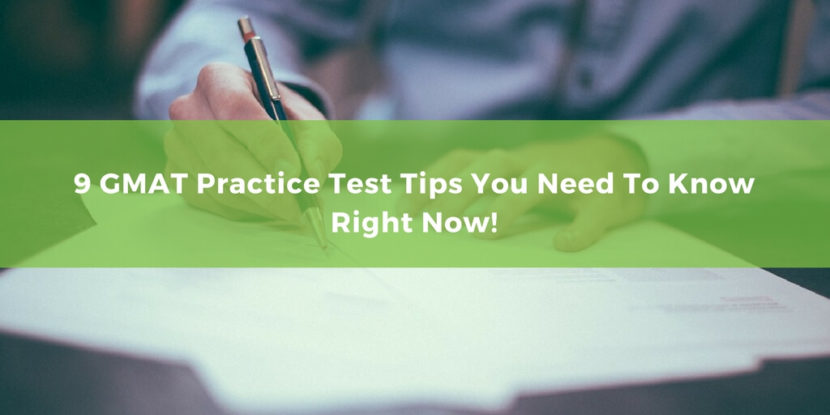“If you don’t know where you are, then you can’t get to where you want to go.”
Simulation exams a.k.a Practice tests are one of the most important elements for your GMAT preparation plan.
Every practice test you take brings you one step closer to getting a similar question right on the actual GMAT.
It basically acts like a preview of the test.
The scores you get on your practice tests only predict your scoring range and not your actual score – because of the GMAT adaptive algorithm.
As you take more tests, your score also improves – meaning if you scored a 500 on the first practice test, a 570 on another, and a 650 on the third, your score is now up to the 650 mark.
However, as we know the discrepancies in the adaptive algorithms on practice tests, you may be in the 630-650 score range, but not exactly 650.
So, if you manage to get a 710 on a practice test, it is safe to assume (provided you answer the questions right and within the time frame) that on the actual GMAT your score would range from 690 – 720)
Any practice test you take (official practice tests) won’t follow the actual algorithm but will be as close to the original as possible.
Disclaimer :There are a lot of unofficial GMAT Practice tests out there, so if you want a close-to-accurate score, we suggest you don’t pick random tests.
Read our article on Decoding the GMAT Algorithm – A Cheat sheet to get a detailed understanding on the working of the adaptive algorithm.
The GMAC provides 6 full-length GMAT practice tests on its website, two free and four paid. Once you take the test, after analysing where you stand, you can reset and take the test again -provided your level has improved, you will start scoring better, and therefore start seeing tougher questions on the same test.
Apart from the official full-length practice tests from mba.com, you can also give CrackVerbal’s abridged mini-test a try : GMAT Score Calculator.
Now that we’ve established where you should be looking to take the right GMAT practice tests, let’s move on to tell you the impact these tests will have on your final GMAT score!
Importance of taking Practice Tests
The GMAT practice test act as diagnostic tests.
If you sign up for a test-prep course, ideally the first thing you should be doing is taking a practice test.
The objective of taking a practice test first is to determine the level you are at before you begin your GMAT preparation. It will help you recognize your strengths and make you aware of the areas where you need to focus more.
Apart from the limitations of the test (adaptive algorithm scoring pattern), there are 9 factors you should watch out for while taking the test :
1. Knowledge of the content (Quant and Verbal)
Say out of 10 questions, you recognize only 6. That leaves you with 4 questions you’ve never come across before.
Practice tests will help explore different question types and improve your chances to get a higher score on the actual GMAT.
2. Increase in Speed
At first – if you’re a beginner, meaning, you may not even be able to complete the whole test within the given time frame.
If you can – that’s brilliant!
Taking practice tests improves your speed and time management skills. Once you start getting a hold of the concepts, solving multiple questions during your prep time, applying them during the test makes it only that much faster and easier.
For example – completing the test in 55 minutes instead of 65 minutes isn’t necessarily the best strategy.
It’s all about giving every question the right amount of time and also working on it with a certain pace.
3. Familiarity with the exam
Whether you are taking the test for the first time, or the third time, practice tests are a way to evaluate your strengths and weaknesses.
Understanding concepts in isolation while preparing for the test is different from applying all of them in a random sequence, one after the other – during the actual test.
To do that, mental preparation and stamina is essential.
And when it comes to preparing a study plan, practice tests play a major role. For example, if your RC skills are weaker than your SE skills – and you found that out through the practice test, you can adapt your strategy according to your requirement.
4. Manage your time
The more tests you take, your accuracy improves. It will help you calculate the approximate time taken to solve each question (maintain a log – it’ll help track progress).
Say, if you are super confident about Algebra Questions, and are weak at Statistics, you can allot more time towards solving Statistics, and get the Algebra questions out of the way faster.
Granted- you can’t choose which chapters you want to complete first as the questions are thrown at random, but it’s up to you to decide how much time you want to devote to each question.
And practice tests help you do just that!
5. Analyze your Verbal and Quant score split
If your practice test result shows you got a 30 in Quant and a 43 in Verbal, you can shift your focus on strengthening your Quant skills first.
As you keep taking these practice tests parallely with your prep, you’ll know how to balance your Quant and Verbal scores to land up with a great 3 digit score!
6. Review your wrong answers
Practice tests usually let you review the questions you answered incorrectly.
And next time if a similar question appears, you’ll wrap it up within minutes – thus improving your speed and accuracy.
Use these practice tests as a tool to measure your performance.
7. Build your endurance
Practice tests act as stimulation tests.
When we say stimulation tests, it is not just about familiarizing yourself with the test pattern, questions and the structure.
It is also about making yourself comfortable in that environment where your focus lies completely on the test for 3 and a half hours – well in the case of a practice test ( 62 minutes + 65 minutes) – Quant and Verbal.
It is important that you mentally prepare yourself for that kind of focus. And thus – practice tests act as a stimulation to help build your endurance.
8. Maintain a log
When you know you’ve got a question wrong, make a note of it. You can later go over the question and review where you went wrong.
You can also answer a series of similar questions – it will help tackle the question the next time around much easier.
9. Plan ahead
Once you’ve taken a few tests, you’ll figure which areas need more attention, and the concepts you are more confident about.
It will help create a study plan for the week/month – based on your personal plan.
Basic Do’s and Don’ts
No coaching centre or tutor will ever not, not ask you to take practice tests.
However there are a few things you need to keep in mind :

And that is about all you need to know on taking GMAT Practice Tests.
If you need any assistance while preparing for the GMAT, we’re just one click away.


